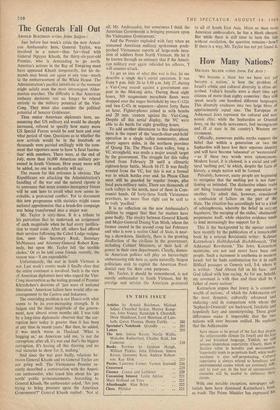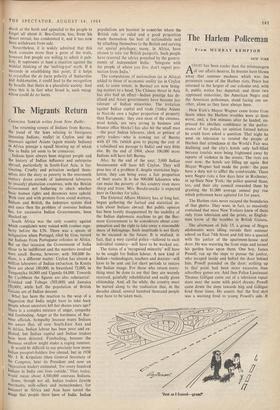How Many Nations?
MICHAEL SEI.ZER writes from Tel Aviv: 'We became a State but we have not yet become a nation,' is how the problem of Israel's ethnic and cultural diversity is often de- scribed. Today's Israelis were a short time ag6 citizens of more than eighty countries : they still speak nearly one hundred different languages. This diversity coalesces into two large blocs of approximately equal size. The European or Ashkenazi Jews represent the cultural and eco- nomic elite; while the Sephardim or Oriental Jews, on the whole newcomers, feel incongruous and ill at ease in the country's Western en- vironment.
Officially, numerous public myths support the belief that within a generation or two the Sephardim will have lost their separate identity, and will have become 'educated' or 'westernised' —as if these two words were synonymous. Modern Israel, it is claimed, is a social and cul- tural 'melting pot,' in which, despite the facts of history, a single nation will be formed.
Privately, however, many people are beginning to recognise that the melting pot is not func-' tioning as intended. The distinctive ethnic traits are being transmitted from one generation to another. To admit this, however, considered a confession of failure on the part of tlie State. The situation has accordingly led to a kind of schizophrenia, whereby the belief in mizzug hagaluyot, 'the merging of the exiles,' obstinatelyi perpetuates itself, while objective evidence tends' to lend increasingly less support for it.
This is the background to the uproar caused, here recently by the publication of a remarkable' book by a veteran Revisionist writer: Kali/Ian' Katznelson's HaMahpekah HaAshkenazit, 'The Ashkenazi Revolution.' The Jews, Katznelsonl maintains, are not and never have been one people. Such a statement is anathema in modern Israel; but he finds confirmation for it in such Biblical passages as Genesis xvii, 3-4, where it is written : 'And Abram fell on his face: and' God talked with him saying, As for me, behold, my covenant is with thee and thou shalf be father of many nations.'
Katznelson argues that Jewry is 'a common- wealth of nations,' of which the Ashkenazim are the most dynamic, culturally advanced and enduring—and in comparison with whom the `Sephardo-Orientals' are backward, fatalistic and hopelessly lazy and unenterprising. These great differences make it impossible that the two nations will ever become unified. He explains that the Ashkenazim have reason to be proud of the fact that despite the unfavourable climate fin Israel] and the loss of our historical language, Yiddish, we 0.11 possess stupendous superiority. Clearly, there 15 decisive value in heredity and environment' Superiority tends to perpetuate itself, while back- wardness is also self-perpetuating. Cultural superiority is always related to hereditary a_nd environmental causes which are extremely dim' cult to root out. In the best of circumstancet. centuries will be needed to obliterate- these causes.
With one notable exception, newspaper edi- torials here have dismissed Katznelson's book as trash. The Prime Minister has expressed ills Shock at the book and appealed to the people to forget all about it. Ben-Gurion, too, from his desert retreat, has condemned it, and it has now been withdrawn from sale.
Nevertheless, it is widely admitted that this book contains more than a germ of the truth, however few people are willing to admit it pub- licly. It represents at least a reaction against the Wishful thinking of the 'melting-pot' myth. If it succeeds in establishing this point, if it helps to crystallise the de facto polarity of Sephardim and Ashkenazim, it could lead to the recognition by Israelis that theirs is a pluralistic society. And since this is in fact what Israel is, such recog- nition could do no harm.





























 Previous page
Previous page